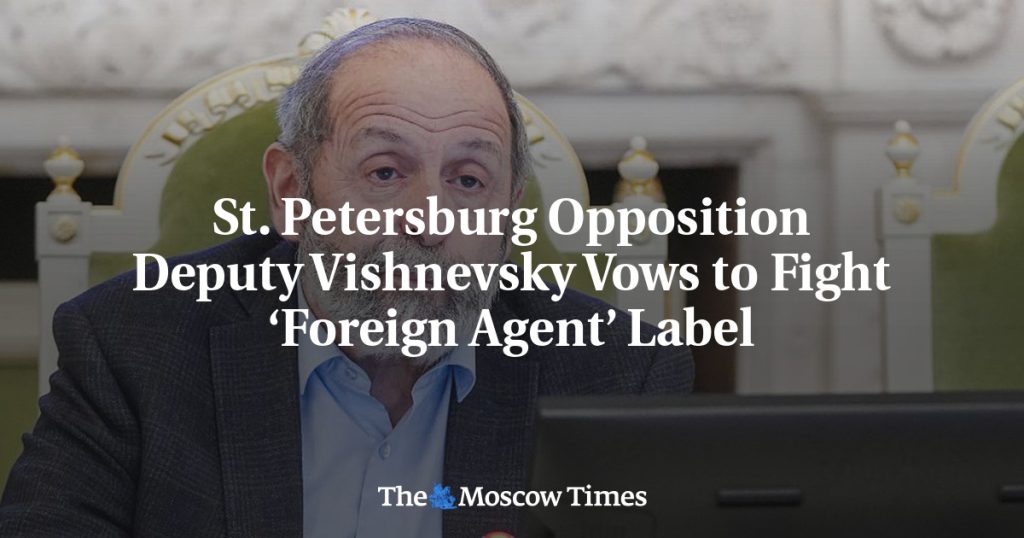Boris Vishnevsky, a prominent opposition politician in St. Petersburg, is planning to challenge the recent designation of being labeled a “foreign agent” by Russia’s Justice Ministry. This decision was made in response to Vishnevsky’s opposition to the 2022 invasion of Ukraine and his regular contributions to foreign media. Vishnevsky views this designation as a personal insult and plans to prove its unlawfulness in court, emphasizing that he represents only the interests of his constituents in Russia and is not influenced by external factors.
In late 2022, Vishnevsky was charged with “discrediting” the Russian military, but a judge sent his case back to the Interior Ministry due to procedural violations. Following this, St. Petersburg’s legislative assembly voted to strip him of two committee seats. During the session’s opening roll call, the assembly speaker introduced Vishnevsky as a “foreign agent,” and local media circulated photos showing a “foreign agent” label on his nameplate. Vishnevsky criticized Russia’s foreign agent legislation, arguing that it is no longer about foreign funding or working for international organizations, but rather a response to individuals who take a public political stance.
Russia’s “foreign agents” law has evolved since its initial passage in 2012, with officials citing the need to respond to similar legislation in the United States. Individuals and entities designated as “foreign agents” are required to comply with strict self-disclosure and auditing requirements. Despite these regulations, Vishnevsky maintains that he operates independently and is guided only by the Russian Constitution. His challenge to the designation as a “foreign agent” highlights the ongoing crackdown on opposition voices in Russia, particularly those who speak out against government policies such as the invasion of Ukraine.
Vishnevsky’s decision to pursue legal action against the “foreign agent” label underscores the broader crackdown on dissent in Russia, where opposition politicians face increasing pressure and scrutiny from the government. The targeting of Vishnevsky for his opposition to the invasion of Ukraine reflects the government’s efforts to silence dissenting voices and suppress criticism of its policies. By challenging the designation in court, Vishnevsky is seeking to defend his right to express his political views and uphold the principles of democracy and freedom of speech in Russia.
The labeling of Vishnevsky as a “foreign agent” is part of a broader pattern of government repression against opposition figures and critics of the Kremlin. The expanded use of the foreign agents law since its introduction in 2012 represents a growing trend of crackdowns on dissent in Russia. Vishnevsky’s determination to challenge his designation as a foreign agent demonstrates his commitment to standing up against government censorship and defending the right to openly express political opinions in a country where opposition voices are increasingly under threat.
Ultimately, Vishnevsky’s decision to contest his designation as a “foreign agent” in court is a significant development in the ongoing crackdown on opposition voices in Russia. By challenging the government’s labeling of him as a foreign agent, he is fighting to protect his right to speak out against government policies and advocate for the interests of his constituents. Vishnevsky’s case highlights the broader challenges faced by opposition politicians and critics of the Kremlin in Russia, where dissent is increasingly met with censorship, intimidation, and repression. His legal battle represents a critical test of the country’s commitment to democracy and the rule of law, as well as the ability of individuals to freely express their political views without fear of government retaliation.


